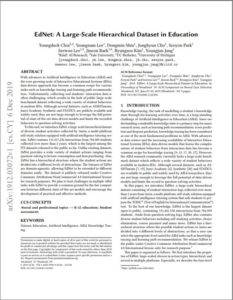Riiid, a global leading AI tutor solution provider, announced that it would establish an AI-education database ‘EdNet,’ which is an open database for AI education intended to drive the development of the AIEd industry.
In addition, the company has released 130 million interactions of intelligent tutoring system(ITS) datasets, specifically related to learning and test exercise data accumulated since 2017 on its solution called ‘Santa,’ as well as its knowledge tracing algorithm based on its deep learning module architecture, Transformer.
AI Researchers at Riiid recently published a research paper entitled ‘EdNet: A Large-Scale Hierarchical Dataset in Education’ available via arXiv, a free online archive for scientific papers. EdNet has been designed as an open database on diverse learning actions of unspecified multiple users. It will contain information on test exercises, correct or wrong responses for each test item, in addition to data related to student actions such as actual scores versus target scores, the time users spend solving questions, and the timing of content purchase.
Public release of educational interactions
In addition, Riiid has also made public more than 130 million of non-personal identifiable information (PII) interactions data collected from 784,309 users on ‘Santa,’ the firm’s AI-based learning solution launched in 2017. The release marks the largest among the ITS datasets released to the public so far. Riiid also has released its knowledge tracing algorithm based on Transformer, a deep-learning module architecture, which predicts whether students will get questions right or wrong in a given exercise. The open-source releases will allow further research of how Riiid’s models are programmed, as well as test accuracy and effectiveness, ultimately enabling the building of new models for performance comparison.

The Korean startup plans to continue to release additional data on EdNet every year and host algorithm development challenges in various AIEd-related tasks to attract more research talent to the area and promote the AI-powered education market. To date, there have been several meaningful open-source release cases which have enhanced business competitiveness and driven dramatic developments in the industry. Notably, ImageNet, the open-source image database created by researchers at Princeton University and Stanford University, provided a catalyst for research into AI-enabled visual recognition. In 2010, the ImageNet Challenge was also launched, with participants competing to achieve higher accuracy on several visual recognition tasks based on publicly released AI algorithms.
“Despite enormous growth potential, the education sector is still lacking in AI research different from the finance and medical sectors,” said YJ Jang, Co-founder and CEO, Riiid. “Mainly due to the conservative nature of the education sector, education data is rarely digitized. Riiid is committed to taking the initiative in addressing this issue, and I am confident that just as ImageNet played a significant role in computer vision research progress, EdNet will be able to drive the development of AIEd. And eventually, it will take the firm’s growth to new heights.”
Riiid recently joined the AI Summit 2019 held in mid-December in New York, with Youngduck Choi, AI Tech Lead, delivering a keynote speech entitled ‘Make Education Great Again.’ He presented the future direction for research in AI-powered education and the EdTech industry and highlighting the importance of technological transparency and practical precision.





